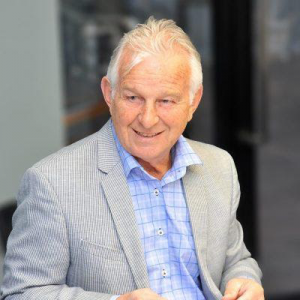About Us
The HERA Foundation achieves its objectives governed by a honorary Board of Trustees, a small admin team and solid base funding.
Our Structure
The HERA Foundation is a Charitable Trust Board established in 1992 by a trust deed between HERA (Heavy Engineering Research Association) and its First Trustees.
The HERA Foundation Trust Board consists of 5 trustees and by rotation include the Chair and Deputy Chair of HERA. To ensure the boards independence of HERA, the other three trustees are appointed on 5 year terms by the Trust Board. One additional trustee can be co-opted.
Our Trustees are:
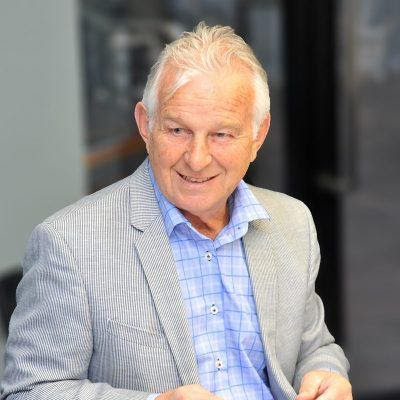
Noel Davies
Joint Managing Director, Hydraulink Fluid Connectors I Independent Trustee I HERA Foundation Chair
Noel Davies served 21 years in the Royal New Zealand Navy finishing as a Lieutenant Commander in the Logistics Department. His last job was based in Southampton where he and a team of three others were responsible for putting the HMNZS Southland through a refit at Vosper Thornicroft’s yard. When he retired in 1985, he worked for a publicly listed company in a division that was associated with the metals industry. The crash of 1989 saw Noel purchase a company which again was involved in the metals industry. During his time in the Navy, he undertook not only professional training but also courses on people management and coaching, strategic planning, communication, financial management and both military and civil law, but the most valuable Noel beliefs, was the training he received on how to work with a team or individual to get them aligned and focused on achieving the best possible outcomes.
Noel believes in giving back to society and has been involved in many charitable and business organizations. In 1986, this drive led him to stand as a Board Member of the New Zealand Engineering Federation (NZEF). As their representative, in 1992, he joined the HERA Executive and later became the HERA Chair, the first non-engineer to do so. In 2006 he elected HERA Foundation Trustee and Chair. The HERA Foundation Chair role also meant him staying on as Foundation representative on the HERA Board, making him the longest serving HERA Executive. In 2023 he will have completed 30 years of continuous service to the metals industry.
Supporting strong cross-sector industry initiatives, he was instrumental for HERA, as industry research association, developing a R&D-related industry advocacy role. He supported, along with other kindred organisations, the formation of the industry association Metals New Zealand and became later its chair.
But Noel applies his drive, commercial nonce, people skills and ability to think strategically not just to engineering, and since leaving the Navy he has become the Chair of several successful companies and not-for-profit organizations such as the Auckland Medical Research Association, naval organizations, and through his big love for sport to the Board of Baseball New Zealand, the Chair of Tautara Baseball and Basketball, and Hockey NZ.
His latest passion is the restoration of wetlands and the planting of native trees. Noel is a keen Boaty, golfer and fisherman, he enjoys time with his family, their beach house, travel and red wine.
Says Noel about his vision and contribution to the HERA Foundation: “I would love to continue contributing to the engineering industry because I believe that a successful vibrant metals industry is so important to the New Zealand Economy and that HERA has a key role to play in achieving this. I really enjoy the people in HERA and its members who never fail to amaze me with talents and abilities.”
Dave Anderson
Technical Director, John Jones Steel | Ex-officio Trustee as HERA Chair


Craig Stevenson
Technical Director – Built Environment, Aurecon | Ex-Officio Trustee as HERA Deputy Chair
As Technical Director and structural engineer with Aurecon, my professional career spans 30+ years. During this time I’ve played key roles in the design and design management of a range of building and civil infrastructure engineering projects in New Zealand and across Asia. Currently, I’m responsible for management and technical leadership, client development and project delivery in the Built Environment business of Aurecon.
I’ve been involved in the successful delivery of a wide range of technically complex and challenging projects across New Zealand, Hong Kong, China and Vietnam. Bringing a creative and innovative design approach to engineering, with specific capability in high rise buildings, airport terminal facilities, retail and health facilities. I have particular expertise in seismic engineering and have been responsible for numerous seismic assessments of building structures, strengthening and major extensions to existing buildings.
I’m a strong advocate of the use of structural steel in the building sector – and believe being part of HERA’s Executive Board, and associated to this, serving as a trustee on the HERA Foundation Board, is a pathway for supporting, promoting and having conversations that work towards this.
Duncan Fraser
Director ACME Engineering I Independent Trustee I HERA Foundation Deputy Chair
Duncan Fraser has been a HERA Foundation trustee since 2012 having previously served on the HERA executive for 15 years including one term as Chairman.
Duncan has a BE (Hons) degree from Canterbury University in Mechanical Engineering, is an NZIW Certified Welding Engineer and is a Fellow of Engineering New Zealand.
Duncan is Managing Director of Acme Engineering Ltd, a heavy engineering fabricator based in Petone, Wellington.
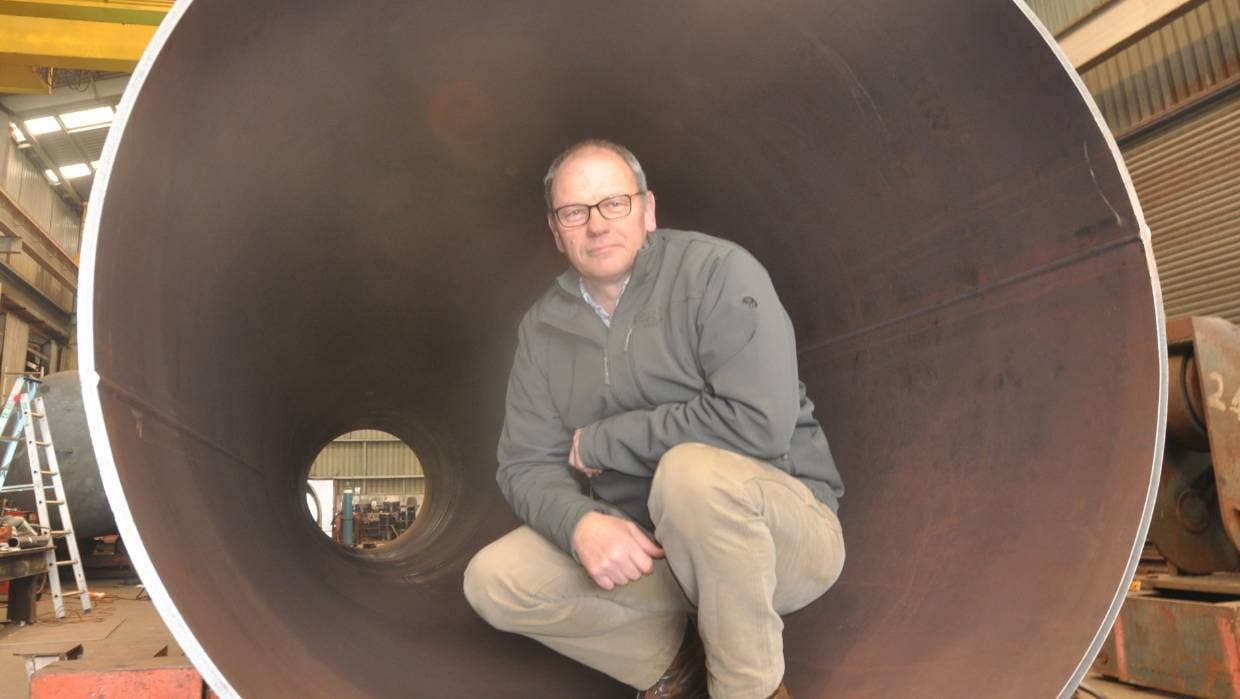
Sean Gledhill
Director Beca I HERA Trustee
How the HERA Foundation is base funded
Thanks to the vision of our industry leaders and a government of the day being supportive of industry driven R&D, the New Zeeland Heavy Engineering Research Association (HERA) was set up in 1978 based on its own Heavy Engineering Research Levy (HERL) Act. By way of this legislation, HERA receives stable base funding from an industry-paid levy on heavy steel and welding consumables collected by the government on behalf of its industry.
Additional to considerable government research contributions during its establishment years, in 1986 HERA also received a 50% government contribution towards building its home base named HERA House.
With the view to enlarge the funding base for industry research and development purposes, the HERA Executive established in 1992 the charitable Heavy Engineering Educational and Research Foundation (HEERF), which in 2019 was renamed HERA Foundation.
And to establish stable base income for the Foundation to fund its objectives, HERA gifted HERA House to the Foundation and agreed to pay commercial rates for leasing the building to HERA as main tenant.
FY21/22 Annual Report
Read More
HERA Foundation Chair Report for Year Ending 30th June 2022
Kia Ora
HERA Charitable Trust
As an introduction, the HERA Foundation is a charitable trust with the mission to promote the study and understanding of the use of ferrous and non-ferrous metals in the engineering industry. It was established by HERA through settlement of its HERA House assets to provide income to the Trust to meet its objectives.
What did we do? And how did we do it.
- HERA House – Building Maintenance and Development
The HERA Foundation’s main asset is HERA House, which is New Zealand’s centre for research, education, and coming together of its metal-based engineering industry. Maintaining and further developing HERA House is the Trust’s number one objective.
The approved HERA Innovation Centre Project, put on hold in the previous year, was restarted. Our tenant HERA requested to consider obtaining Greenstar 6 rating for the Centre as a first for a structural steel building in New Zealand. Following a Greenstar 6 feasibility assessment, the trustees agreed with HERA to change the design as a verifiable contribution to our climate challenges.
The carpark extension, replacing carparks to be used by the Innovation Centre to be build, has been completed and we are pleased to report that it meets environmental requirements of stormwater retention and detention and 2 Electric Vehicle charging stations, assisting to meet the envisaged Greenstar 6 rating for the Innovation Centre.
In FY 21/22 a total of $191,371 was spent via depreciation on HERA House compared to $169,152 in the previous year.
- HERA Grant Projects
Continuing our efforts to drive research and industry development, this year’s Grant to HERA was $13,500 as compared to $14,508 in the previous year. It supported the HERA visiting scholar program the HERA student membership program and.
This year’s HERA Foundation Scholar was Prof Pingsha Dong from the University of Michigan, USA. Due to Covid 19 his contribution was delivered in from of an e-format course covering the theme “Principles and methods for design of welded structures”.
The HERA student membership program contributes to the student membership of HERA were there are currently 121 student members. The program supports the Māori in Engineering Whanake Scholarships (x3), discounted and/or free design guides & seminars and free student access to the MetalMind app. This year the program also supported the UoA Mechanical & Mechatronic engineering student association (MECHA) wellness event before their exams) and you find more information here from the MECHA event. The program is also now supporting the AUT Woman in Tech, which includes providing mentors to the students.
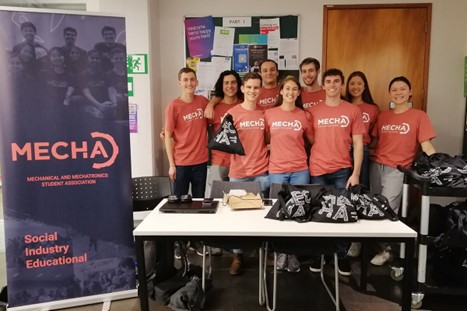
Mental health is something that businesses are needing to think more deeply about when it comes to the health and safety of their teams. This is why the HERA Foundation is pleased to support HERA to sponsor this year’s University of Auckland’s MECHA wellness events and drop the stigma around looking after mental health in lead up to exams
The HERA student awards program this year was again put on hold due to Covid, but here is the link to the presentation of The HERA UoA award for the best final year project involving metals. And via the HERA student membership program, the Foundation supported the HERA Woman in Engineering AUT award winner (Jasmine Schwieters) who received a financial sweetener to celebrate her award.
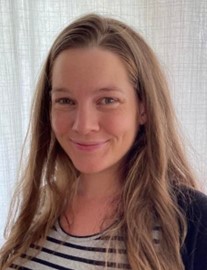
HERA Woman in Engineering AUT award winner Jasmine Schwieters
- HERA-administered R&D Projects
This year’s budget for HERA-administered R&D projects was $75,000. However, due to developments outside HERA and its university partners’ control, a R&D grant refund took place and $34,499 were given back to the Foundation.
In the welding/steel construction area, at the end of the previous financial year, a new PhD scholar had started at the University of Auckland as part of the HERA seismic research program. However, health issues forced the recipient to step back, and most of the $35,000 annual scholarship grant was paid back.
A second approved scholarship in the HERA seismic research program had a late set back with a signed-up recipient stepping back due to an industry work offer. Something highlighting the challenge to provide attractive scholarships leading to a more academic oriented professional pathway.
The ROBUST research program jointly performed by the UoC and UoA, supports large scale testing of New Zealand seismic connections in co-operation with China’s Tongji University. Due to Covid 19 the program was delayed and completing is now not expected before end of 2022.
Want to support the HERA Foundation?
It is the one of the goals of the Foundation to support top class research, innovation and understanding of disruptive technologies to boost engagement and innovation within our workforce and as such, I would like to remind you that you have an opportunity to make a real difference. A small donation can immediately have an impact on the future of our workforce and ability to share and foster expertise – because if our industry isn’t willing to support itself, who will?
As your Chairperson, I would like to encourage you to make a living donation now – not only to be able to see the positive difference your contribution can make, but also so you can benefit from the tax rebates you’re given through supporting our charitable trust.
To support the donation process but also to demonstrate our achievements and share our successes, we have developed our own HERA Foundation website which just got live (www.herafoundation.org.nz). And why not make now a small contribution through the Donate-now portal of our new website.
Our people
Our Foundation relies on the generosity of our industry and the support of our board of trustees. Together with fellow trustees Duncan Fraser, HERA Chair Dave Anderson; HERA Deputy Chair Craig Stevenson and former HERA Director Dr Wolfgang Scholz who also performs the Secretary/Treasurer Function, I look forward to seeing the rewards of our efforts to promote and grow the metals industry into the future.
Nga mihinui ki a koutou katoa
Noel Davies
Chair
FY20/21 Annual Report
Read More
HERA Foundation responds proactively to 2nd year of Covid 19
Kia Ora
Financial Year Ending June 2021 and COVID
It is fair to say that unlike most companies in New Zealand, the Foundation was not hugely impacted by a year of uncertainty and disruption not seen before. In response to COVID, the Board took a people first approach to ensure that all staff were safe, and we liaised with the CEO of HERA to ensure COVID Plans for the building were developed, refined, and modified to suit the changing levels.
Income:
The main income impact of the various COVID-19 lock downs was that the Board agreed to leave HERA’s tenant rent unchanged and not to impose a valuer recommended 4.5% rent increase
Expenses:
Main expense items affected were:
- Building maintenance was up by 45% compared to last year as we took the opportunity to carry out needed maintenance.
- We went ahead with building a new carpark.
- Compared to last year we spent $29k less in scholarships because signed up scholarship recipients did not show up.
- Some projects did indeed go ahead as planned, such as:
- our own website development,
- The HERA student membership initiative,
- Further planning work for the HERA Innovation Centre
The net result was income was on budget and on par for last year, and expenses $6.5K behind last which resulted in $5K of additional surplus compared to last year ($112,938 compared to 107,923).
Our building activities
In the previous FY we responded enthusiastically to the HERA request to build a dedicated HERA Innovation Centre adjacent to the existing HERA House. We also went out to our members soliciting sponsorship contributions to the new addition with excellent indicative commitment. However, with the onset of Covid19 the HERA Executive requested putting the development on hold but opted for going ahead with the related carpark extension to cater for the carparks to be lost when the Innovation Centre will be built.
The trustees agreed with this request and opted for a new, environmentally responsive permeable paving solution, which also provides for future roof water detention from the to be built Innovation Centre. The permeable paving concept will be subject of a case study and in this context, we want specifically to acknowledge the sponsorship received from paving stone suppliers Bower Brothers. The car-park development also included two EV charging stations with greatly appreciated sponsorship from HERA member and HERA House tenant Steltech.
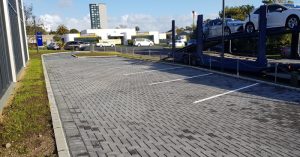
HERA House novel permeable paving technology carpark
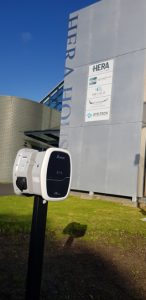
Future Proofing HERA House – new EV charging stations
Our grants
As noted above, due to Covid 19, our grants to drive research and industry development was modest only. Our Grant to HERA and universities was $48,500. This was only 16% of our income while usually we spent about 30-50%. Three HERA related programs benefitted from this:
In the welding/steel construction area, new PhD scholar Xin Chen started at the University of Auckland as part of the HERA seismic research program. A second contracted student could not start due to Covid 19, however we hope to fill the gap shortly with a new applicant.
The ROBUST research program jointly performed by the UoC and UoA, supports large scale testing of New Zealand seismic connections in co-operation with China’s Tongji University. Due to Covid 19 the program was delayed and completing is no not expected before end of 2022.
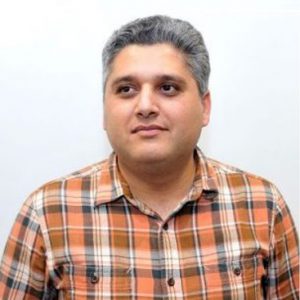
Former HERA Foundation PhD scholar, now HERA staff member and soon to be Dr Hafez Taheri
Congratulations go to a former HERA Foundation scholarship recipient and now HERA staff member Hafez Taheri for the awarding of his PhD in Civil Engineering by the UoA. Completing a PhD in Engineering is hard work, and it is great to see that the Trust investment paid off.
Supporting professional development
This year’s visiting expert was associated with structural engineering and due to Covid 19 his presentation was in e-format. Robert E. Shaw Jr from the Steep Structures Technology Centre (SSTC), USA delivered his structural bolting course to over 45 engineers across New Zealand and Australia.
The HERA student membership program supports the student membership of HERA, university student association events, student awards, Maori in Engineering Whanake Scholarship, and the development of resource material for engineering students.
But the traditional sponsorship of HERA student prizes for metals-based projects did not eventuate. The popular university events were not held due to Covid-19.
Want to support the HERA Foundation?
It is the one of the goals of the Foundation to support top class research, innovation and understanding of disruptive technologies to boost engagement and innovation within our workforce and as such, I would like to remind you that you have an opportunity to make a real difference. A small donation can immediately have an impact on the future of our workforce and ability to share and foster expertise – because if our industry isn’t willing to support itself, who will?
To support the donation process but also to demonstrate our achievements and share our successes, we have developed our own HERA Foundation website (www.herafoundation.org.nz) and it should be live from September 2022.
As your Chairperson, I would like to encourage you to make a living donation now – not only to be able to see the positive difference your contribution can make, but also so you can benefit from the tax rebates you’re given through supporting our charitable trust.
Our people
Our Foundation relies on the generosity of our industry and the support of our board of trustees. Together with fellow trustees Duncan Fraser, HERA Chair Dave Anderson; HERA Deputy Chair Craig Stevenson and former HERA Director Dr Wolfgang Scholz who also performs the Secretary/Treasurer Function, I look forward to seeing the rewards of our efforts to promote and grow the metals industry into the future.
Nga mihinui ki a koutou katoa
Noel Davies
Chair
FY19/20 Annual Report
Read More
HERA Foundation supports HERA Innovation Centre development and responds to Covid19 challenges
The HERA Foundation is a charitable trust with the mission to promote the study and understanding of the use of ferrous and non-ferrous metals in the engineering industry. It was established by HERA through settlement of its HERA House assets to provide income to the Trust to meet its objectives.
- Our income and expenses
Our total income was $312k – obtained through HERA House earnings, donations, and interest on an endowment fund.
Normally around 30-50% of these funds go back to the Metals Industry via Grants to HERA for postgrad scholarships and supporting several research and educational programs. However, due to Covid19, there were delays in the commencement of scholarship starts, and as a consequence only 13% of the available funds were spent.
The reminder of income goes back into administration, maintenance and future proofing our main asset which is HERA House. This year we paid back the last $171,000 of our loan taken out to refurbish HERA House.
We also responded to the HERA request to build a dedicated HERA Innovation Centre adjacent to the existing HERA House and $126k was spend planning the new building and achieving resource consent. We also went out to our members soliciting sponsorship contributions to the new addition with excellent indicative commitment. However, with the onset of Covid19 and the subsequent financial uncertainty, the HERA Executive requested putting the development on hold. The trustees agreed with this request and at the closure as at the date of this report, the hold project was still on hold.
- Our grants
Continuing our efforts to drive research and industry development, our Grant to HERA was $41,681 for FY19/20. Five HERA research programmes benefitted from this, namely:
The HERA seismic research program, performed in conjunction with the New Zealand universities AUT, UoA and UoC, has been New Zealand’s most successful, long-term steel construction program and leading to ongoing improvements making our buildings safer while at the same time maintaining our industry’s cost effectiveness. And the Foundation trustees are pleased to be able to support this program especially with getting new professional talent into this technology.
PhD scholar Hafez Taheri completed the last of his 3 years of scholarship support and is now a HERA research engineer. His research comes up with new pragmatic design provision for cost-effective, full penetration T-butt welds in welded moment connections. Hafez is about to hand in his thesis and a key publication his has been peer reviewed and is about to be published by the Welding in the World journal. And now at HERA he is working on implementing his findings in our design guides
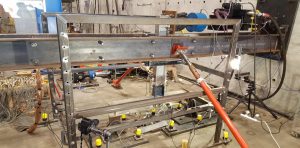
As a world-first, Hafez Taheri seismic testing program also included welded stainless steel moment frame samples, demonstrating a promising pathway for the use of stainless steel for example in exposed architectural steel.
In continuation of HERA seismic program two further new PhD scholarships had been approved for starting in the FY reported on. However, a change in mind of one of the contracted students and Covid 19 delays for the second coming from overseas, meant a change in plans and the trustees will shortly be reviewing what will happen to this program.
Via a co-operation of UoA and AUT, UoA-graduated PhD, Dr Shahab Ramhormozian, is now as lecturer in Structural and Earthquake Engineering, writing up the Sliding Hinge Joint (SHJ) design guide. This SHJ design started out many years ago with the Foundation supported PhD of Ass. Prof. Charles Clifton and the Foundation is proud now supporting its professional application. The SJH design has been continuously improved into the no-damage Optimised SJH (OSHJ) design. Aim of the guide is to explain the OSHJ advantages of superior performance over traditional systems and the lifetime of a building with no need to inspect/retighten/replace the sliding components following a severe earthquake and show how to design them. The project is delayed due to Covid19 and an industry trial application providing useful feedback.
The Foundation’s $25k support for the international ROBUST (Robust Building Systems) Project – a co-operative international research project seismically testing a real size building incorporating the latest New Zealand seismic connections – demonstrated the effectiveness of our grant application and contracting process, including ensuring that the developed IP will be available to our industry. Struggling financially to take advantage of this unique offer by China’s Tongji University, the UoC led consortium came to the Foundation and other organisations such as BRANZ and EQC, asking for support of the New Zealand input into the test building. Good progress was made, but again due to the Covid19 crisis the project delivery will be delayed.
The fifth sponsored project supported the investigation of a disruptive, steel-based, sustainable cycleway concept by former HERA Director Dr Wolfgang Scholz. The concept’s vision is to build weather-shielded cycle highways instead of costly new roads, complementing the conventional cycleway infrastructure and allowing dependable, high volume usage on the worst-weather day which is justifying the large investment. Named SkyCylce due to option for going into the third dimension in space constraint city environments, the concept’s feasibility has been researched in a discussion paper and is published as HERA Report R5-89. It is hoped that it will stipulate innovative thinking around sustainable transport solutions with the long-term view of SkyCycle becoming a business opportunity for our industry.
- Supporting professional development
HERA Foundation’s visiting 2019/20 expert was Prof Adolf Hobbacher, giving a seminar series on ‘Design of Welded Structures – Fatigue and Fracture’ in Auckland, Wellington, Hamilton and Christchurch in February 2020.
With over 75 professionals attending, the seminars covered a range of fatigue assessment techniques focussing on a widely used assessment based on a nominal stress method as used in AS/NZS 5100.6, NZS 3404.1 and AS 4100 as well as IIW Guideline “Fatigue design of welded structures”. Work examples to demonstrate the application of the assessment methodology were presented giving attendees the knowledge to make appropriate interpretations of existing design and analysis methods included in various codes and standards.
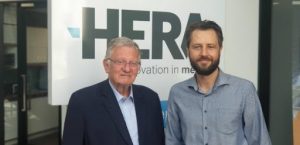
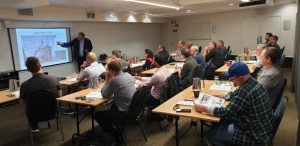
Attendees at the Welded Structures Design seminar with in insert Prof Adolf Hobbacher (left) and NZ Welding Centre Manger Dr Michail Karpenko
The HERA Foundation also continued its support for the HERA student membership established last year by its CEO, Dr Troy Coyle. The Foundation funding was used to develop as a student resource the P4001 Steel Design Guide, which is due to be released shortly. HERA now has 53 student members across our technical oriented universities and has started profiling student members in the HERA social network and is regularly posting in the student only Facebook page. A student panel session at the HERA Future Forum explored how the students felt about our industry.
Our student awards grant supported once again final year mechanical engineering student project events for both the University of Auckland (UoA) and Auckland University of Technology (AUT). It is pleasing to see metals engineering continues to be a topic of choice for our students.
At AUT the HERA prize was awarded to Amjad Mohideen, Kurt Russell and Wen Jun See for their project “TIG Welding of Boron/Boron Free Steels”.

HERA research engineer Hafez Taheri presenting the HERA Prize to AUT’s Wen Jun See on behalf of his team
At the UoA’s Department of Mechanical Engineering Final Year Project Displays the HERA prize went to Ravindra Anurithan and Joseph Tildesley for their project on “Design and Manufacture of Compliant Structures for in-road Wireless Electric Vehicle Charging Solutions”. Their project focused on Soft Magnetic Composites (SMCs), which are made from ferrous metal powder and polyurethane resins and assessed on their suitability for in-road inductive power transfer application developed by the University of Auckland’s Power Electronics Group.
- Want to support the HERA Foundation?
It is the one of the goals of the Foundation to support top class research, innovation and understanding of disruptive technologies to boost engagement and innovation within our workforce and as such, I would like to remind you that you have an opportunity to make a real difference. A small donation can immediately have an impact on the future of our workforce and ability to share and foster expertise – because if our industry isn’t willing to support itself, who will?
As your Chairperson, I would like to encourage you to make a living donation now – not only to be able to see the positive difference your contribution can make, but also so you can benefit from the tax rebates you’re given through supporting our charitable trust.
- Our people
Our Foundation relies on the generosity of our industry and the support of our board. Together with fellow trustees Duncan Fraser, HERA Chair Matthew Kidson, HERA Deputy Chair Dave Anderson; and former HERA Director Dr Wolfgang Scholz who also performs the Secretary/Treasurer Function, I look forward to seeing the rewards of our efforts to promote and grow the metals industry into the future.
Noel Davies
Chair
FY18/19 Annual Report
Read More
The HERA Foundation reviewed its trust deed and developed a future focused strategy
HERA’s quest to promote the study and understanding of ferrous and non-ferrous metals in engineering is pursued through the independent charitable trust the HERA Foundation.
Our income
Our total income was $312k – obtained through HERA House earnings, donations and interest on an endowment fund offered in support of our key objectives. About 33% of these funds were transferred back to industry via a Grant to HERA to run a number of projects and award sponsorships. The reminder goes back into administering and future proofing our asset HERA House.
Our grants
Continuing our efforts to drive research and industry development, our Grant to HERA was $102,312 for FY2018/19. Four HERA research programs benefitted from this.
In the welding/steel construction area, PhD scholar Hafez Taheri started his third year with excellent progress in his research on the performance of welded structures in seismic active regions. He is close to completing his PhD and has already been made an offer by HERA to become a staff member in the Welding Centre.
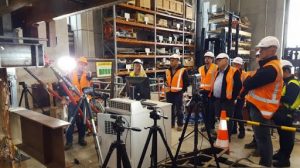
PhD student Hafez Taheri with representatives from UoA and Industry witnessing seismic test #5. The insert shows one example of longitudinal weld test specimen prepared for determining fillet weld strength
In an effort to ensure our research finds its application we supported the development and publication of a design guide on sliding hinges as used in steel construction. This project is being performed by PhD student, Shahab Ramhormozian, who started out as PhD student at the University of Auckland and is now a lecturer at AUT.
In the AGGAT renewable energy program, UoA PhD student Shoulung Dong completed his third and last year of the HERA Foundation scholarship into the development of an Expert Design Tool which will simplify design tasks within Organic Rankine Cycle (ORC) plant and help assessing prospective heat resources for ORC application. We understand that Shoulong is close to completing his PhD. The fourth project supported is a business development initiative by our former HERA Director Dr Wolfgang Scholz. Wolfgang is investigating the economic and technical viability of all-weather cycle and pedestrian paths on the ground and elevated and hence in the “Skycycle” project name. He reported to our members in HERA’s February MetalBase. A draft paper on the concept has been delivered and will be used for consultation with interested parties and in an upcoming industry workshop to explore member and general interest.
Supporting professional development
HERA Foundation’s visiting 2018/19 Expert was Arrie van Niekerk, a leading specialist facilitator on Theory of Constraints (TOC). Arrie says improvement of more than 20% is experienced regularly, within the same infrastructure with the same people, but with a different mental framework. A 2-day training course was held in Auckland and in Christchurch plus an individual training session for HERA staff with very positive attendee feedback.
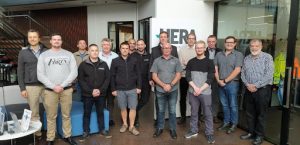
Theory Of Constraint training seminar attendees in Auckland. Visiting Expert Arrie van Niekerk is on the left
A new HERA Foundation supported initiative of HERA CEO Dr Troy Coyle was the establishment of a HERA student membership. Essential steps such as defining the student category, developing a marketing frame work, changing the HERA rules and receiving HERA Executive approval have been achieved. Additionally, as part of our long-term commitment to the HERA student membership, development started on a student design guide for worked steel construction design examples.
Our student awards grant supported once again University of Auckland Final Year Projects for Mechanical Engineering. With around 180 students and 90 projects on display – our prize was specifically offered for projects involving metals. This year awarding students Nancy Zhou and Mildred Wong with our ‘Best Metals Project’ for our sponsored category. Great to see two female students winning our award and you can read up on this award in the November MetalBase.
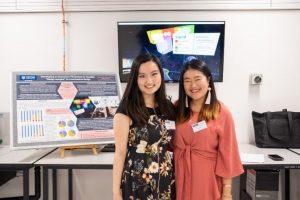
Winners of the HERA 2018 Mechanical Engineering Final Year Project prize
Although strongly linked to HERA as their charitable foundation, complying with an updated Charitable Trust Act requires the independent running of the HERA Foundation. The review of our trust deed in this regard led to a change in our trustee’s appointment rules.
However, in alignment with HERA we also decided to develop our own strategy with focus on meeting our trust’s objectives particularly in the skills development area. In practice this means not just relying on the income from HERA House but to actively raise more founds through sponsorship.
Associated with this sponsorship goal was the objective to increase the profile of the foundation. Along with this went the decision to establish our own website and in a first step create our own logo. A logo design competition was held with our new logo being adopted symbolising the people aspect of our work and the strong link to HERA.
As we support top class research, innovation and understanding of disruptive technologies to boost engagement and innovation within our workforce, I’d remind you that you have an opportunity to make a real difference. A small donation can immediately have an impact on the future of our workforce and ability to share and foster expertise – because if our industry isn’t willing to support itself, who will?
And as your Chairperson, I’d like to encourage you to make a living donation now – not only to be able to see the positive difference your contribution can make, but also so you can benefit from the tax rebates you’re given through supporting our charitable trust
Our people
Our Foundation relies on the generosity of our industry and the support of our board. Together with fellow trustees Duncan Fraser, HERA Chair Mike Lehan, HERA Deputy Chair Matthew Kidson; and Dr Wolfgang Scholz who also performs the Secretary/Treasurer Function, I look forward to seeing the rewards of our efforts to promote and grow the metals industry over the next few years.
Noel Davies
Chair

